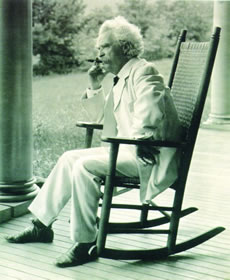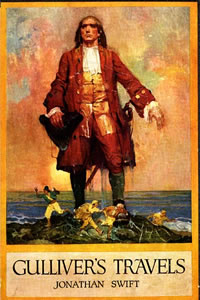De Nederlandse dichter en schrijver Jan G. Elburg werd geboren op 30 november 1919 te Wemeldinge. Zie ook alle tags voor Jan G. Elburg op dit blog.
Liefste omdat de winter een kwaad seizoen is
Over ons voortbestaan
wordt beslist bij handopsteken
van verkeersagenten en sneeuw.
ik maak mij warm met waar praten
omdat in je gezicht je ogen
staan als twee bevende boeketjes.
dit stempelt mij met een gloed van haast
en met lippen met mijn naam van jezus
ertussen.
met herinnering aan kushanden.
overwinterend in mijn
keel
stoor ik mij met
hergezichten.
netels hart heb ik
en over van mijzelf.
onder het kaarslicht van
een winterhemel
hoor ik mijn mensen.
ik ent mij
op mensen
messen
hoogmoed
spelletje voor vingers
en vindersloon
en loopsheid
brood en ander eten.
ere wie mij toekomt
een lang hert een karyatide
van korenschoven een geloof
van aanwrijven
muren in en uit het liefde leven
van de helft dezer eeuw
een levende deense
ondersteek van vlees
voor mijn teveel
een hese hinde
van heel snelle benen
een afrekening.
er is haast geen tijd meer om te bekomen
van ons gevoel voor seizoenen.
ik verkavel
mij rakelings aan het hart voorbij.
er is veel haver in mijn handen
lievekoe.
er gaan paarden van waarheid staan.
haper nu.
laat de koude beschaamd staan buiten.

Jan G. Elburg (30 november 1919 – 13 augustus 1992)
De Amerikaanse schrijver Mark Twain (pseudoniem van Samuel Langhorne Clemens) werd geboren op 30 november 1835 te Florida. Zie ook alle tags voor Mark Twain op dit blog.
Uit: Adventures of Huckleberry Finn
„Miss Watson she kept pecking at me, and it got tiresome and lonesome. By and by they fetched the niggers in and had prayers, and then everybody was off to bed. I went up to my room with a piece of candle, and put it on the table. Then I set down in a chair by the window and tried to think of something cheerful, but it warn’t no use. I felt so lonesome I most wished I was dead. The stars were shining, and the leaves rustled in the woods ever so mournful; and I heard an owl, away off, who-whooing about somebody that was dead, and a whippowill and a dog crying about somebody that was going to die; and the wind was trying to whisper something to me, and I couldn’t make out what it was, and so it made the cold shivers run over me. Then away out in the woods I heard that kind of a sound that a ghost makes when it wants to tell about something that’s on its mind and can’t make itself understood, and so can’t rest easy in its grave, and has to go about that way every night grieving. I got so down-hearted and scared I did wish I had some company. Pretty soon a spider went crawling up my shoulder, and I flipped it off and it lit in the candle; and before I could budge it was all shriveled up. I didn’t need anybody to tell me that that was an awful bad sign and would fetch me some bad luck, so I was scared and most shook the clothes off of me. I got up and turned around in my tracks three times and crossed my breast every time; and then I tied up a little lock of my hair with a thread to keep witches away. But I hadn’t no confidence. You do that when you’ve lost a horseshoe that you’ve found, instead of nailing it up over the door, but I hadn’t ever heard anybody say it was any way to keep off bad luck when you’d killed a spider.“

Mark Twain (30 november 1835 – 21 april 1910)
De Engelse schrijver Jonathan Swift werd op 30 november 1667 in Dublin geboren uit Engelse ouders. Zie ook alle tags alle tags voor Jonathan Swift op dit blog.
Uit: Gulliver’s Travels
„It would not be proper, for some reasons, to trouble the reader with the particulars of our adventures in those seas; let it suffice to inform him, that in our passage from thence to the East Indies, we were driven by a violent storm to the north-west of Van Diemen’s Land. By an observation, we found ourselves in the latitude of 30 degrees 2 minutes south. Twelve of our crew were dead by immoderate labour and ill food; the rest were in a very weak condition. On the 5th of November, which was the beginning of summer in those parts, the weather being very hazy, the seamen spied a rock within half a cable’s length of the ship; but the wind was so strong, that we were driven directly upon it, and immediately split. Six of the crew, of whom I was one, having let down the boat into the sea, made a shift to get clear of the ship and the rock. We rowed, by my computation, about three leagues, till we were able to work no longer, being already spent with labour while we were in the ship. We therefore trusted ourselves to the mercy of the waves, and in about half an hour the boat was overset by a sudden flurry from the north. What became of my companions in the boat, as well as of those who escaped on the rock, or were left in the vessel, I cannot tell; but conclude they were all lost. For my own part, I swam as fortune directed me, and was pushed forward by wind and tide. I often let my legs drop, and could feel no bottom; but when I was almost gone, and able to struggle no longer, I found myself within my depth; and by this time the storm was much abated. The declivity was so small, that I walked near a mile before I got to the shore, which I conjectured was about eight o’clock in the evening. I then advanced forward near half a mile, but could not discover any sign of houses or inhabitants; at least I was in so weak a condition, that I did not observe them. I was extremely tired, and with that, and the heat of the weather, and about half a pint of brandy that I drank as I left the ship, I found myself much inclined to sleep.“

Jonathan Swift (30 november 1667 – 19 oktober 1745)
Boekomslag
